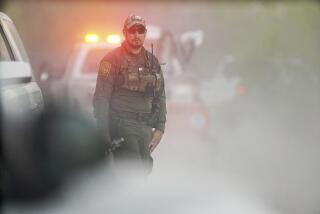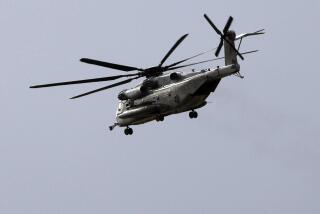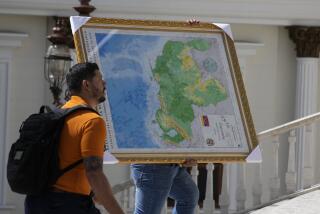Rebels’ Killing of 52 Colombian Troops Further Sets Back Peace Process
- Share via
BOGOTA, Colombia — In a demoralizing setback for the military that further soured public sentiment toward stalled peace talks, at least 52 Colombian troops died in the crash of a U.S.-made helicopter and an ensuing guerrilla ambush, military officials said Friday.
“This wasn’t a rout,” military spokesman Capt. Jose Espejo said. Nevertheless, he acknowledged that the crash and its aftermath caused the highest number of casualties that the armed forces have suffered in two years.
All 22 troops aboard the Black Hawk helicopter died when it plummeted to the ground Thursday after coming under fire from members of this country’s largest rebel army, the leftist Revolutionary Armed Forces of Colombia, or FARC.
Colombian air force officials said that the helicopter was trying to land when it was attacked and that its tail dug into the ground as the pilot attempted an emergency maneuver to evade rebel bullets. But military sources said the pilot’s body was found with gunshot wounds, prompting speculation that he had been shot while still in the air and that the helicopter had crashed as the co-pilot struggled to gain control of the aircraft.
Thirty others died when foot soldiers trying to reach the site were ambushed by guerrillas.
The helicopter was transporting troops to the northern hamlet of Dabeiba, where the police garrison was under FARC attack. Dabeiba is 210 miles northwest of Bogota, the capital, on the fringe of a banana region used to import illegal arms and export illegal drugs.
Two police officers and at least two insurgents also were killed in Dabeiba, where buildings were reduced to splintered frames by rebel attacks. One blast left a ragged hole in a church ceiling.
The deaths came during a week when local newscasts aired footage from an attack on a military unit in the southern Putumayo region, where the FARC has maintained an “armed strike” for more than a month, blocking access to the area. Such images have increased skepticism about Colombia’s peace process with the FARC, now in its second year, and increased frustration over what is seen as a soft stance by the government.
“The young boys are fighting while the government doesn’t do anything,” Dorela Agudelo told television reporters outside a morgue in the northern city of Medellin, where she had gone to ask about a soldier who she feared was involved in the fighting.
A three-day meeting aimed at reinvigorating the peace process by bringing together private citizens with government officials and rebels in Costa Rica ended inconclusively Wednesday after FARC leaders declined to attend because of security concerns.
Speaking at a Bogota university Friday, President Andres Pastrana reiterated his commitment to a negotiated solution to Colombia’s decades-old civil conflict, which leaves an average of 3,000 people dead each year. He also sought support for the country’s peace process, despite the latest bloodletting.
“We want to make peace in [an atmosphere of] peace,” he said. “But we won’t give up on a vision for a better world because of some rifle rounds.”
More to Read
Sign up for Essential California
The most important California stories and recommendations in your inbox every morning.
You may occasionally receive promotional content from the Los Angeles Times.













